
 (732) 246-1377
(732) 246-1377
 (732) 246-1377
(732) 246-1377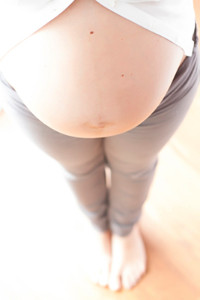 Pregnancy can create additional pressure on the feet, making certain everyday activities and responsibilities difficult for women. Women who work desk jobs should ensure that they’re sitting in chairs that offer optimal support, while women who spend a majority of their time standing should occasionally elevate their feet using a foot rest. Wearing comfortable shoes is also a must and should never be overlooked. Elevating the feet can also help pregnant women in managing edema, as the feet often swell during pregnancy.
Pregnancy can create additional pressure on the feet, making certain everyday activities and responsibilities difficult for women. Women who work desk jobs should ensure that they’re sitting in chairs that offer optimal support, while women who spend a majority of their time standing should occasionally elevate their feet using a foot rest. Wearing comfortable shoes is also a must and should never be overlooked. Elevating the feet can also help pregnant women in managing edema, as the feet often swell during pregnancy.
Pregnant women with swollen feet can be treated with a variety of different methods that are readily available. For more information about other cures for swollen feet during pregnancy, consult with one of our podiatrists from Livingston Footcare. Our doctors will attend to all of your foot and ankle needs.
What Foot Problems Can Arise During Pregnancy?
One problem that can occur is overpronation, which occurs when the arch of the foot flattens and tends to roll inward. This can cause pain and discomfort in your heels while you’re walking or even just standing up, trying to support your baby.
Another problem is edema, or swelling in the extremities. This often affects the feet during pregnancy but tends to occur in the later stages.
How Can I Keep My Feet Healthy During Pregnancy?
If you have any questions please feel free to contact our office located in North Brunswick, NJ . We offer the newest diagnostic and treatment technologies for all your foot and ankle needs.
Read more about Pregnancy and Foot Health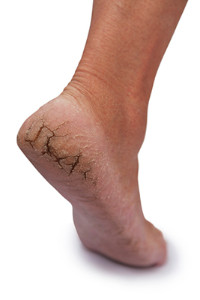 Whether it’s cold, hot, or somewhere in between, cracked heels can be hard to endure. While severe cases should be tended to by a podiatrist, one can manage their cracked heels at home by ensuring that proper moisturizing of the feet is steadily maintained. Soaking the feet in warm water can help soften roughened and hardened skin, while dead skin can be exfoliated with a pumice stone. After soaking, ensure that the feet are gently dried with a soft towel. After drying, moisturize the feet with a hydrating lotion. Wearing socks immediately after lotioning the feet can help the skin lock in moisture.
Whether it’s cold, hot, or somewhere in between, cracked heels can be hard to endure. While severe cases should be tended to by a podiatrist, one can manage their cracked heels at home by ensuring that proper moisturizing of the feet is steadily maintained. Soaking the feet in warm water can help soften roughened and hardened skin, while dead skin can be exfoliated with a pumice stone. After soaking, ensure that the feet are gently dried with a soft towel. After drying, moisturize the feet with a hydrating lotion. Wearing socks immediately after lotioning the feet can help the skin lock in moisture.
Cracked heels are unsightly and can cause further damage to your shoes and feet. If you have any concerns, contact one of our podiatrists from Livingston Footcare. Our doctors can provide the care you need to keep you pain-free and on your feet.
Cracked Heels
Cracked heels appear unappealing and can make it harder for you walk around in sandals. Aside from looking unpleasant, cracked heels can also tear stockings, socks, and wear out your shoes. There are several methods to help restore a cracked heel and prevent further damage.
How Do You Get Them?
Dry skin is the number one culprit in creating cracked heels. Many athletes, walkers, joggers, and even swimmers suffer from cracked heels. Age and skin oil production play a role to getting cracked heels as well.
Promote Healing
Over the counter medicines can help, especially for those that need instant relief or who suffer from chronic dry feet.
Wear Socks – Wearing socks with medicated creams helps lock in moisture.
Moisturizers – Applying both day and night will help alleviate dryness which causes cracking.
Pumice Stones – These exfoliate and remove dead skin, which allows for smoother moisturizer application and better absorption into the skin.
Change in Diet
Eating healthy with a well-balanced diet will give the skin a fresh and radiant look. Your body responds to the kinds of food you ingest. Omega-3 fatty acids and zinc supplements can also revitalize skin tissue.
Most importantly, seek professional help if unsure how to proceed in treating cracked heels. A podiatrist will help you with any questions or information needed.
If you have any questions, please feel free to contact our office located in North Brunswick, NJ . We offer the newest diagnostic and treatment technologies for all your foot care needs.
Read more about Solutions for Cracked Heels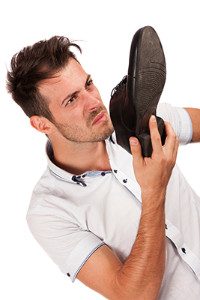 When the feet are kept wrapped up in thick socks and heavy winter boots, sweat is no surprise. Sweat from the feet is a natural occurrence, however there are a number of tips you can rely on to ease sweaty and potentially smelly feet: Take off your shoes as soon as you get home to air out the feet, rotate between shoes and avoid wearing the same pair consistently everyday, and wash the feet thoroughly when bathing, especially after exercise. If you are experiencing sweaty feet all year round, you may have a disorder called hyperhidrosis. Speak with your doctor in order to discuss treatment options for this condition.
When the feet are kept wrapped up in thick socks and heavy winter boots, sweat is no surprise. Sweat from the feet is a natural occurrence, however there are a number of tips you can rely on to ease sweaty and potentially smelly feet: Take off your shoes as soon as you get home to air out the feet, rotate between shoes and avoid wearing the same pair consistently everyday, and wash the feet thoroughly when bathing, especially after exercise. If you are experiencing sweaty feet all year round, you may have a disorder called hyperhidrosis. Speak with your doctor in order to discuss treatment options for this condition.
If you are suffering from hyperhidrosis contact one of our podiatrists of Livingston Footcare. Our doctors can provide the care you need to attend to all of your foot and ankle needs.
Hyperhidrosis of the Feet
Hyperhidrosis is a rare disorder that can cause people to have excessive sweating of their feet. This can usually occur all on its own without rigorous activity involved. People who suffer from hyperhidrosis may also experience sweaty palms.
Although it is said that sweating is a healthy process meant to cool down the body temperature and to maintain a proper internal temperature, hyperhidrosis may prove to be a huge hindrance on a person’s everyday life.
Plantar hyperhidrosis is considered to be the main form of hyperhidrosis. Secondary hyperhidrosis can refer to sweating that occurs in areas other than the feet or hands and armpits. Often this may be a sign of it being related to another medical condition such as menopause, hyperthyroidism and even Parkinson’s disease.
In order to alleviate this condition, it is important to see your doctor so that they may prescribe the necessary medications so that you can begin to live a normal life again. If this is left untreated, it is said that it will persist throughout an individual’s life.
A last resort approach would be surgery, but it is best to speak with your doctor to find out what may be the best treatment for you.
If you have any questions please feel free to contact our office located in North Brunswick, NJ . We offer the newest diagnostic and treatment technologies for all your foot and ankle needs.
Read more about Hyperhidrosis of the Feet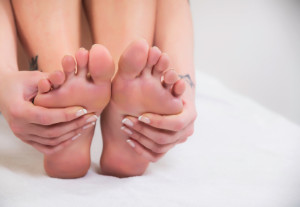 Among foot conditions, corns and calluses are often seen as some of the more harmless concerns. Regardless, if either condition does become troublesome, there are methods available for removal. Because calluses are essentially small areas of thick, hardened skin, softening them can help aid in their removal. Soaking the feet in warm water and avoiding using harsh soaps while washing can help maintain softness of the skin. Hard areas can also be buffed away using a pumice stone. If you are suffering from corns or calluses and seek ways to remove them, consult with your podiatrist.
Among foot conditions, corns and calluses are often seen as some of the more harmless concerns. Regardless, if either condition does become troublesome, there are methods available for removal. Because calluses are essentially small areas of thick, hardened skin, softening them can help aid in their removal. Soaking the feet in warm water and avoiding using harsh soaps while washing can help maintain softness of the skin. Hard areas can also be buffed away using a pumice stone. If you are suffering from corns or calluses and seek ways to remove them, consult with your podiatrist.
If you have any concerns regarding your feet and ankles, contact one of our podiatrists of Livingston Footcare. Our doctors will treat your foot and ankle needs.
Corns: What Are They? and How Do You Get Rid of Them?
Corns can be described as areas of the skin that have thickened to the point of becoming painful or irritating. They are often layers and layers of the skin that have become dry and rough, and are normally smaller than calluses.
Ways to Prevent Corns
There are many ways to get rid of painful corns such as wearing:
Treating Corns
Treatment of corns involves removing the dead skin that has built up in the specific area of the foot. Consult with Our doctors to determine the best treatment option for your case of corns.
If you have any questions please feel free to contact our office located in North Brunswick, NJ . We offer the newest diagnostic and treatment technologies for all your foot and ankle needs.
 Walking is a simple exercise and is one of the easiest that can bring about great results for one’s health. While conditions for walking are often great during the spring, summer and fall, the coldness of the winter often makes it hard to maintain a regular walking regimen. Unless the weather outside is extreme, consider the following recommendations to help get you outside: Check the wind chill before heading out, dress for the weather, invest in the right footwear, stretch to warm up the muscles, stay hydrated, adjust your route to match the conditions outside, and wear reflective clothing when it’s dark.
Walking is a simple exercise and is one of the easiest that can bring about great results for one’s health. While conditions for walking are often great during the spring, summer and fall, the coldness of the winter often makes it hard to maintain a regular walking regimen. Unless the weather outside is extreme, consider the following recommendations to help get you outside: Check the wind chill before heading out, dress for the weather, invest in the right footwear, stretch to warm up the muscles, stay hydrated, adjust your route to match the conditions outside, and wear reflective clothing when it’s dark.
Exercising your feet regularly with the proper foot wear is a great way to prevent injuries. If you have any concerns about your feet, contact one of our podiatrists from Livingston Footcare. Our doctors can provide the care you need to keep you pain-free and on your feet.
Exercise for Your Feet
Exercise for your feet can help you to gain strength, mobility and flexibility in your feet. They say that strengthening your feet can be just as rewarding as strengthening another part of the body. Your feet are very important and often we forget about them in our daily tasks. But it is because of our feet that are we able to get going and do what we need to. For those of us fortunate not to have any foot problems, it is an important gesture to take care of them to ensure its good health in the long run.
Some foot health exercises can include ankle pumps, tip-toeing, toe rise, lifting off the floor doing reps and sets, also flexing the toes and involving the shins may help too. It is best to speak with your doctor regarding how to do these fitness steps and how often is right for you. Everyone’s needs and bodies are different and it varies from individual to individual to determine what should be done for you to maintain strength in your feet.
Once you get into a routine of doing regular exercise, you may notice a difference in your feet and how strong they may become.
If you have any questions please feel free to contact our office located in North Brunswick, NJ. We offer the newest diagnostic and treatment technologies for all your foot and ankle needs.
 According to the American College of Foot and Ankle Surgeons (ACFAS), it’s important to keep your feet safe during the winter months with proper footwear. Proper winter footwear should provide traction against the snow and icy surfaces. The footwear should also keep your feet warm, insulated, and be water-resistant. Proper protection can help ward off against poor blood circulation caused by the cold. Wearing breathable, moisture-resistant socks can also offer greater protection, as keeping the feet dry is just as important as keeping them warm.
According to the American College of Foot and Ankle Surgeons (ACFAS), it’s important to keep your feet safe during the winter months with proper footwear. Proper winter footwear should provide traction against the snow and icy surfaces. The footwear should also keep your feet warm, insulated, and be water-resistant. Proper protection can help ward off against poor blood circulation caused by the cold. Wearing breathable, moisture-resistant socks can also offer greater protection, as keeping the feet dry is just as important as keeping them warm.
Finding a properly-fitting shoe is important in reducing injuries and preventing foot problems. For more information about treatment, contact one of our podiatrists from Livingston Footcare. Our doctors can provide the care you need to keep you pain-free and on your feet.
Proper Shoe Fitting
A common concern when it comes to foot health, having properly fitted shoes can help prevent injuries to the foot. Out feet affect our posture and gait, which in turn affects the biomechanics and overall bodily structure. With 33 joints, 26 bones, and over 100 ligaments, the potential for serious injury is much greater than one realizes. Although the feet cease growth in adulthood, they still change shape as they mature. Here are some factors to consider when it comes to investing in proper fitting shoes:
● Be sure the shoes fit correctly right away
● Ensure the ball of your foot fits comfortably in the widest portion of the shoes
● Even though they may look fashionable, improper fitting shoes can either create adverse conditions or exacerbate existing ones you may already have
● Walk along a carpeted surface to ensure the shoes comfortably fit during normal activity
Keeping in mind how shoes fit the biomechanics of your body, properly-fitting shoes are vitally important. Fortunately, it is not difficult to acquire footwear that fits correctly. Be sure to wear shoes that support the overall structure of your body. Do your feet a favor and invest in several pairs of well-fitted shoes today.
If you have any questions please feel free to contact our office located in North Brunswick, NJ. We offer the newest diagnostic and treatment technologies for all your foot and ankle needs.
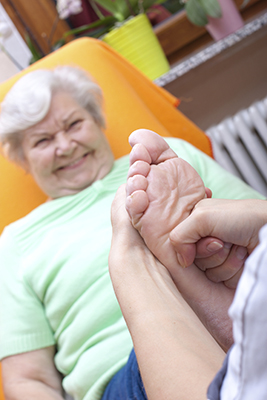 For those who have been diagnosed with diabetes, or those with family members who have diabetes, taking care of your feet is something that should be taken very seriously. Because of the lack of circulation in the feet and legs, numbness or loss of feeling can occur. This could prevent detection of problems such as an ulcer. That, coupled with inordinately slow healing, can cause infections to persist, spread, and even lead to amputation. Make sure to look out for signs of foot problems. If you have numbness or loss of feeling, sores, or any type of slow-healing wound, see a doctor immediately.
For those who have been diagnosed with diabetes, or those with family members who have diabetes, taking care of your feet is something that should be taken very seriously. Because of the lack of circulation in the feet and legs, numbness or loss of feeling can occur. This could prevent detection of problems such as an ulcer. That, coupled with inordinately slow healing, can cause infections to persist, spread, and even lead to amputation. Make sure to look out for signs of foot problems. If you have numbness or loss of feeling, sores, or any type of slow-healing wound, see a doctor immediately.
Diabetic foot care is important in preventing foot ailments such as ulcers. If you are suffering from diabetes or have any other concerns about your feet, contact one of our podiatrists from Livingston Footcare. Our doctors will answer any of your foot- and ankle-related questions.
Diabetic Foot Care
Diabetes affects millions of people every year. Diabetes can damage blood vessels in many parts of the body, including the feet. Because of this, taking care of your feet is essential if you have diabetes, and having a podiatrist help monitor your foot health is highly recommended.
The Importance of Caring for Your Feet
● Routinely inspect your feet for bruises or sores.
● Wear socks that fit your feet comfortably.
● Wear comfortable shoes that provide adequate support.
Patients with diabetes should have their doctor monitor their blood levels because blood sugar levels play such a huge role in diabetic care. Monitoring these levels on a regular basis is highly advised.
It is always best to inform your healthcare professional of any concerns you may have regarding your feet, especially for diabetic patients. Early treatment and routine foot examinations are keys to maintaining proper health, especially because severe complications can arise if proper treatment is not applied.
If you have any questions, please feel free to contact our office in North Brunswick, NJ. We offer the newest diagnostic and treatment technologies for all your foot care needs.
Millions of people are affected by diabetes each year. Diabetes damages blood vessels in all parts of the body, especially the feet. The legs and feet may develop slow blood flow, which causes neuropathy, or nerve damage. Once a diabetic patient develops neuropathy, it is important that the feet are well taken care of. Otherwise, the lower limbs may have to be amputated. This only happens in drastic cases, but it shows how seriously diabetic foot care should be taken.
It is very important to always wash and dry the feet thoroughly, especially in between the toes, if you’re a diabetic. Secondly, examining your feet and toes for redness or sores must be done, even if you do not feel pain. You may also want to examine your feet from the bottom. Try to avoid wearing colored socks to prevent infections that may occur from the dye. Well-fitting socks are also highly recommended.
A diabetic’s physician should always monitor their blood levels to test how well blood sugars are being maintained. In addition to giving advice about everyday eating habits and foot care, a physician may prescribe medicine to help with the diabetic patient’s neuropathy. It is also advised to see a podiatrist if experiencing any feet conditions. Toenails may also need to be taken care of by a podiatrist. This prevents patients from cutting too deeply around their cuticles, which can lead to infection.
A person can take care of their feet at home by following the instructions of their physician. Using creams on one’s feet is also an effective way to heal dryness. Proceed with caution when using tools to remove calluses, as severe diabetics may not be able to feel pain on their feet. If any complications arise do not hesitate to contact a podiatrist.
On a daily basis, diabetic feet must be checked. If you are ever concerned about something, contact your health care professional. You never want to wait until a wound becomes too severe to treat. If left untreated, gangrene may develop. Gangrene is a serious infection that can lead to sepsis or amputation. It is also important for diabetics to be on the lookout for ulcers. Ulcers are sores that develop from tissue loss on the skin. They can be quite painful and require intensive treatment. Early treatment and everyday inspection are imperative to staying healthy.
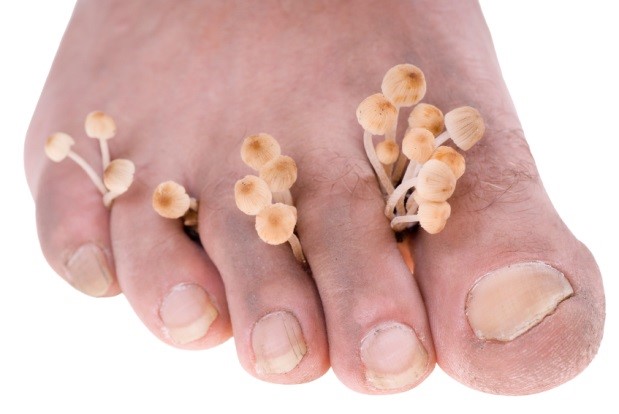 Toenail fungus is a very common disease that affects nearly 20% of Americans today. Ways to prevent contracting this infection are to keep your feet dry, clean, and away from any potential active fungus. Toenail fungus, also known as Onychomycosis, is contagious and care should be taken to never share clippers or scissors. Family members are at high risk of contracting the infection from one another, so awareness of the condition is vital to stemming its spread. There are a number of treatments including topical ointment, pharmaceuticals, and cold laser therapy.
Toenail fungus is a very common disease that affects nearly 20% of Americans today. Ways to prevent contracting this infection are to keep your feet dry, clean, and away from any potential active fungus. Toenail fungus, also known as Onychomycosis, is contagious and care should be taken to never share clippers or scissors. Family members are at high risk of contracting the infection from one another, so awareness of the condition is vital to stemming its spread. There are a number of treatments including topical ointment, pharmaceuticals, and cold laser therapy.
For more information about treatment, contact one of our podiatrists from Livingston Footcare. Our doctors can provide the care you need to keep you pain-free and on your feet.
Toenail Fungus Treatment
Toenail fungus is a problem which affects many people and is hard to get rid of. Fortunately, there are several methods to go about treating toenail fungus.
Antibiotics & Treatments
Lamisil – is the most commonly effective treatment for toenail fungus. It is available as an antibiotic Terbinafine tablet and cream. Terbinafine is a chemical component which kills fungal growth on the body. Applying regular doses will gradually kill the fungal growth. It is important to keep the area clean and air free.
Talcum powder – applying powder on the feet and shoes helps keep the feet free of moisture and sweat.
Sandals or open toed shoes – wearing these will allow air movement and help keep feet dry. They also expose your feet to light, which fungus cannot tolerate. Socks with moisture wicking material also help as well
Alternative Treatments
There are always surgical procedures that are available for toenail fungus. Some people would like immediate quick removal of toenail fungus. Surgeons will be able to cut through and remove the growth using laser surgery. It is important not to try and remove it yourself. Once removed, your old shoes will need to be replaced to avoid reinfection.
If you have any questions please feel free to contact our office located in North Brunswick, NJ. We offer the newest diagnostic and treatment technologies for all your foot and ankle needs.
Toenail fungus is a frustrating problem that affects many people. It can be persistent and hard to get rid of. As many different types of fungi are present throughout the environment, it is very easy to contract toenail fungus.
The feet are especially susceptible to toenail fungus because shoes and socks create the ideal dark and moist environment that fungal infections thrive in. While fungal infections of the nail plate are quite common, if left untreated they can spread beyond the toenail and into the skin and other parts of the body.
Signs of toenail fungus include a thickened nail that has become yellow or brown in color, a foul smell, and debris beneath the nail. The toe may become painful due to the pressure of a thicker nail or the buildup of debris.
Treatment for toenail fungus is most effective during the early stages of an infection. If there is an accumulation of debris beneath the nail plate, an ingrown nail or a more serious infection can occur. While each treatment varies between patients, your podiatrist may prescribe you oral medications, topical liquids and creams, or laser therapy. To determine the best treatment process for you, be sure to visit your podiatrist at the first signs of toenail fungus.